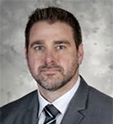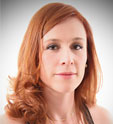Member focus


Interviewed by Mary O’Kane, RD
IFSO Integrated Health Chair
What is your professional background?
I received my B.A. degree in psychology from Western Oregon State University and hold M.S. and Ph.D. degrees in Health Promotion and Education from Purdue University and University of Utah, respectively. I also completed postdoctoral training in behavioral medicine at Brown Alpert Medical School. I currently am a Professor (Research) at The Miriam Hospital and Brown Alpert Medical School-affiliated Weight Control and Diabetes Research Center in Providence, RI, USA.
What led you into the Bariatric Surgery speciality?
As a young faculty member at Virginia Commonwealth University (VCU), I had the fortunate opportunity of being invited by one of the leading bariatric surgeons, Dr. Eric DeMaria, to learn about and study the physical activity behaviors of bariatric surgery patients. Here, we published some of the first papers evaluating pre- and postoperative physical activity patterns and associations with weight loss and other clinical outcomes. It was also here that I had the opportunity to meet, learn from, and collaborate with Dr. Harvey Sugerman, a pioneer and giant in this specialty who we sadly lost this past summer. Finally, it was here where I first observed the multidisciplinary team approach to bariatric surgery. I learned that the expertise of integrated health professionals (e.g., nurses, physician assistants, registered dieticians, psychologists, exercise physiologists, health educators) is key to helping patients attain and sustain optimal outcomes. My experiences working with the team and patients had a profound impact on me at the start of my career some 18 years ago and inspired and motivated me to continue conducting research in this specialty as I have to this day. For the past 13 years, I have had the pleasure of working with Dr. Sivamainthan Vithiananthan, Director of the Center for Bariatric Surgery at the Rhode Island Hospital and The Miriam Hospital, and his multidisciplinary team.
Tell us about your responsibilities at your clinic.
My position in the Weight Control and Diabetes Research Center and work/responsibilities in the clinic are largely dedicated to attaining and executing externally funded research projects. We have been awarded grants from the National Institutes of Health to develop and test: interventions to modify bariatric patients’ physical activity/sedentary behaviors; and combine novel technologies for precise measurement and investigation of behavioral and psychosocial predictors of bariatric surgery outcomes.
What is your favourite part of your job?
I thoroughly enjoy conducting research in the bariatric surgery specialty. It is exciting and rewarding to be a member of a large multidisciplinary team that is invested in not only attaining the best clinical outcomes for patients but also advancing the science of bariatric surgery. I also enjoy working with colleagues across the U.S. and world who seek to enhance understanding of biological, behavioral, and psychosocial aspects of bariatric surgery with the goal of developing adjunctive interventions to promote lifelong postoperative success.
What can you tell us about the upcoming Integrated Health IFSO Conference in Miami?
The last Integrated Health IFSO conference in Madrid offered the most exciting, informative, diverse, and well attended scientific program to date. The upcoming IH IFSO Conference in Miami will build upon this success, offering a program that integrates cutting-edge science, expert-led presentation and discussion of hot topics, issues/controversies, and treatment approaches, and opportunities for IH professionals from around the world to interact, collaborate, and form new relationships.
What would you like to see happen as we aim to grow the IH component of IFSO?
First and foremost, I would like to see the upward growth trajectory of the IH component (in terms of importance and value) within IFSO continue. I would like the IH component to have a “seat at the table” in terms of important decision making as it relates to IFSO policy, position statements, overall conference planning, etc. I think it is also important to bring greater attention to the need for exercise professionals to be a member of the multidisciplinary bariatric team. Finally, I would like to see us continue to build the scientific rigor focus within IH, provide scientific mentorship and networking opportunities, and ultimately develop a scientific foundation that provides competitive seed grant awards.
What would you like the world to know about bariatric surgery in the USA?
The bariatric surgery specialty continues to grow in the USA. The surgeons and IH professionals are highly skilled, passionate, and tireless advocates for their patients. There is a large and collaborative scientific community within this specialty that is dedicated to not only advancing understanding and outcomes of bariatric surgery but also using data to inform the public and policy makers about this life-saving treatment, breaking down remaining stigma-related barriers regarding its use, and improving patient access.
Tell us about your family and hobbies.
My wife & I live in Providence, RI that has excellent seafood and some of the best Italian cuisine outside of Italy. We have a 14- year old son & eight-year old daughter, along with a dog and cat who truly rule our house. We enjoy traveling, exercising, trying new restaurants, and hosting friends and family at our home.

Exercise Physiologist and Kinesiologist
Interviewed by Mary O'Kane, RD
IFSO Integrated Health Chair
What is your professional background?
I have been a registered Physical Education professional for 25 years. In order to deepen my knowledge about how exercises can help with obesity, I undertook research in Exercise Physiology, then specialized in Strength Training at USP (São Paulo University), Functional Training at Cooper Institute, Bariatric Multidisciplinary Team at SBCBM (Brazilian Society of Bariatric and Metabolic Surgery) and Pilates at Authentic Pilates Studios®. Besides that, I completed many courses about Biomechanics and Kinesiology, Exercises for Rehabilitation and Pain.
I have been working in a multidisciplinary team since 2012, prescribing and applying pre- and post-operative physical training. I’m also a professor of several Post Graduation Courses.
In 2019, I started a Master of Science degree at Hospital das Clínicas - Endocrinology (UFPR -Federal University of Paraná). Our focus is to investigate the difference in body composition in women post-bariatric surgery when compared with the same weight women who did not have surgery. After that, the group will join an exercise program to find out the differences in weight, hypertrophy, fat mass, strength, body function and cardiometabolic markers.
During my career, I participated in many international congresses, proposing solutions to bariatric patients with themes like “How to Implement a Healthy Lifestyle Changing Habits”, “Main Barriers to Join a Physical Activity Program”, “Best Techniques to Maintain Muscle Mass”, “Skeletal Muscle as Endocrine Organ”, “Neuromuscular Electrical Stimulation for Bariatric Patients”, “Impact of Strength Training in Bariatric Patients”, “Impact of Physical Activities on Libido”, “Best exercises to Deep Vein Thrombosis” and others. I also had the privilege of writing 3 book chapters about “Exercise Prescription for Bariatric Patients”, “Impact of Physical Activities in Mental Health” and “Physical Training as Sarcopenia Treatment”.
I am proud to be part of the Integrated Health Committee of IFSO. In addition, I’ve been part of Brazilian Congress of Bariatric and Metabolic Surgery Scientific Committee and I’m a former Vice President of Brazilian Society of Bariatric and Metabolic Surgery (SBCBM) - Physical Health Nucleus.
What led you into the Bariatric Surgery speciality?
I started my career working mainly with people with obesity and overweight. In 2010, some health professionals referred clients to me to help intensify the weight loss after bariatric surgery. I noticed there wasn’t much literature on physical activities for patients who had undergone surgery and got very excited with the unrevealed possibilities.
Tell us about your responsibilities at your clinic.
First of all, the patients are evaluated in terms of functionality and strength, body composition, cardiorespiratory fitness, reports of pain, goals and necessities. Owning that information, I developed a plan containing training prescription and tips and advice regarding avoiding sedentary behaviour. Patients can choose a monthly follow-up or to have me as a Personal Trainer to assist them with their training sessions.
What is your favourite part of your job?
It is very relevant for me to see how changes in lifestyle make people happier and satisfied with themselves. People with pain or dysfunction are usually very grateful to return to the life that obesity deprived them in the past.
What can you tell us about the upcoming Integrated Health IFSO Conference in Miami?
The Integrated Health sessions at the IFSO Annual Conference will offer the opportunity to share the daily practice of the best professionals around the world, and also many relevant research outcomes.
I’m particularly excited and interested in increasing our efforts to develop a Physical Activities Guidelines for Patients who have had Bariatric Surgery
What would you like to see happen as we aim to grow as the IH component of IFSO?
First of all, I think it’s decisive to recognize the importance of Integrated Health team. I would like to see an organized network, which could allow us to exchange our daily practice and knowledge the whole year, not only at the congress. In my point of view, the contact with the multidisciplinary team is the key to achieve success in long-term outcomes.
Particularly talking about Physical Activities, I would like to have more members participating actively because we have a huge field to explore in scientific research and daily basis experiences. I’m also looking forward to helping develop guidelines.
Finally, I’d be really happy to have a channel to share our knowledge, as a team, not only with professionals but directly to patients.
What would you like the world to know about Bariatric Surgery in Brazil?
We have amazing professionals in Brazil. Besides their skills, people work with passion and most are really worried about the patient’s health. Our culture has a strong feeling of connection and focuses on finding creative ways to help our patients to achieve their goals.
Tell us about your family and your hobbies.
I feel that I have the best family in the world. My lovely parents and brother have always been my support. My kids are not exactly kids anymore… My first-born is 21 years old (yo) amazing guy. He is responsible, focused, hardworking and became a great professional. My daughter (18 yo) has an astonishing artist’s soul. She is brilliant, courageous and carries the kindest heart I’ve ever seen. My youngest (16 yo) is a very intelligent boy, focused, loving and very funny.
Most of my hobbies are related to physical activities. I do canoeing, trekking (mountains, volcanoes and waterfalls mainly), climbing, abseiling, rafting, archery and sports in general. Being in contact with nature is recharging. I also love music and cultural programs like gigs, theatre, movies and reading.

Interviewed by Mary O'Kane, RD
IFSO Integrated Health Chair
1 .What is your professional background?
I have been a registered dietitian for 22 years. In 1998, after graduating with honors from my Nutrition Course, I began to work in a hospital. In this hospital, I accompanied closely the initial developments of bariatric surgery in my city and my country. Since 2000, I have been working in a private practice specialized in bariatric surgery. In 2002, I began my research in the area of nutrition and bariatric surgery as a master science student at Brasilia’s University. I have participated in various international congresses, presenting the results of my research and have authored and reviewed articles for journals specialized in the field of bariatric nutrition.
I went on for further studies completing my master’s degree in 2005, with a thesis entitled “A Study of Food Intake Patterns, Nutritional State and Weight Loss among Patients submitted to Bariatric Surgery” and my doctorate in 2013, with a thesis entitled, “The Effect of a Preoperative Diet on Visceral Fat among Bariatric Patients in the Preoperative Stage.” I have recently concluded my post-doctoral studies in Bariatric Surgery, with a thesis entitled “Gut Microbiota and PYY / GLP1 among Healthy Weight and Weight Regain Bariatric Patients”.
Over the years, I have done research on topics related to energy expenditure, weight regain, body composition and pregnancy related to Bariatric Surgery.
I am a member of IFSO, ADA, SBCBM and ASMBS and I received a IH Scholarship award from IFSO in 2019.
2. What led you into the Bariatric Surgery specialty?
While working in the hospital, I was invited to accompany patients submitted to Bariatric Surgery and saw first-hand the vast and diversified field of nutrition. I also perceived the need for further research in this area. As I love to study, I began to work and do research in this area.
3. Tell us about your responsibilities in your clinic.
As Chief Nutritionist, I am responsible for guiding our team of nutritionists and as General Manager, I accompany the everyday routine of our administrative staff. At monthly meetings, I offer support and motivation in follow-up sessions with our patients.
4. What is your favorite part of your job?
Primarily, it is contact with our patients, from the preoperative through to the post-surgery phase. Also, I am highly interested in carrying out research and in meeting professionals engaged in this field. At the congresses in which I participate, I look forward to professional growth through the exchange of experience.
5. What can you tell us about the upcoming Integrated Health IFSO Conference in Miami?
I think the choice of having the conference in Miami facilitates access for participants. The wide variety of topics to be presented also indicates the ongoing development in this field.
Doctors, nurses, nutritionists, psychologists, psychiatrists and other healthcare professionals will participate, presenting their findings and proposing their ideas, revealing the evolutionary state of bariatric surgery today. New guidelines and position papers may also be discussed. Basic and advanced courses for professional development will be included in the program.
6. What would you like to see happen as we aim to grow as the IH component of IFSO?
I would like to see more new members entering IFSO, more network meetings and more round table discussions.
7. What would you like the world to know about Bariatric Surgery in Brazil?
Our society is the second largest in the world, after the USA. The most common procedures performed are the RYGBP and Sleeve. Most surgeons work with multidisciplinary teams.
8.Tell us about your family and your hobbies.
I have been married to a bariatric surgeon for 16 years and we have two children, a boy (15) and a girl (9). We also have a little dog.
We love to spend time together as a family, we also love to travel. We enjoy being in contact with nature.
My favorite sport is Volleyball and my children have caught this interest and enjoy playing. I practice meditation and Pilates several times a week and find this very helpful in combatting stress.

Interviewed by Tracy Martinez RN, BSN,CBN
IFSO Integrated Health Chair
1. What is your professional background?
I have been a registered nurse for the last 30 years. I began in perioperative nursing back in 1989 and started in Bariatrics in 1999 in Melbourne, Australia. I am currently the Director of a Weight Loss Surgery program and a residential retreat facility for post bariatric surgery participants in New Zealand, I operate a bariatric vitamin supplement company and have just recently opened an F45 Training boutique gym studio.
2. What lead you into Bariatric Surgery specialty?
When I was working in perioperative nursing in Melbourne, I worked closely as a surgical assistant with a bariatric surgeon, Harry Frydenberg. In 1999, I was between jobs, having just left an Operating suite management role, and Harry encouraged me to speak with the representatives from the Lapband company (BioEnterics) to see if I was interested in a change of roles. I began in sales and marketing for the Lapband and continued with this for the next 3 years. I met my now husband and Bariatric Surgeon, David Schroeder at an Australian Obesity Conference in 2003, and moved to NZ the following year. I continued part-time with Inamed/Allergan (formerly BioEnterics) for a few years in NZ whilst concurrently developing new systems for our patients in my husband’s clinic. I became the Bariatric Program Coordinator in 2010, and Director of the business in 2013. I have earlier this year finished working clinically as a bariatric nurse and now work primarily in a management role, with an education role during our retreat program.
3. Tell us about your responsibilities in your clinic?
As the Director of the company, and the Bariatric Coordinator of the Weight Loss Surgery business, I am responsible, along with my team, for coordinating all of the programs and processes for our surgical and non-surgical patients. I oversee our second Weight Loss Surgery program further south in New Zealand that I have recently given over the management to the primary surgeon, but remain responsible for maintaining their updates and coordinating their systems. I have weekly team input in our practice and hold 3 monthly planning meetings with our integrated health team where we assess and develop comprehensive support programs, strategies, plans and activities for the following 6 months. I am also responsible for the marketing and promotion of our Weight Loss Surgery clinic, and our retreat program and my nutrition supplement business.
4. What is your favorite part of your job?
My favourite time is when I am facilitating and teaching at our residential retreats, which happen every 3-4 weeks. This is a 4-day live-in program, designed for participants who have had bariatric surgery, as well as those non-bariatric participants who wish to improve self-care, self-love and self-acceptance. The visible transformations we see in our participants from the time they arrive to when they leave is one of the most special feelings and the reason I do what I do. To also see the passion, expertise and encouraging support our team provide in empowering our participants, is truly heart-warming.
5. What can you tell us about the upcoming Integrated Health IFSO conference in Dubai this year?
Since we have established a more robust, supportive framework for the Integrated Health section of IFSO, the conference in Dubai will be a great platform for us as a specialty to gain greater recognition for our role in the bariatric surgery field. With Tracy Martinez at the helm and her expertise in developing IH programs, we received a significant number of excellent presentations/studies and as a result have introduced IH sessions covering many interests within this area and I look forward to being a part of this.
6. What would you like to see happen as we aim to grow the IH component of IFSO?
Further collaboration with our surgical colleagues, increased exposure and awareness of the role of the Integrated Health team is what I would like to see develop throughout Bariatric Surgery globally. Recognition for our important and essential role is paramount, and I hope this becomes more apparent as we grow and strengthen our position within IFSO.
7. What would you like the world to know about bariatric surgery in NZ?
Bariatric Surgery in NZ is surprisingly innovative and progressive for a small country of not only 4 million people, but spread out geographically over a long distance. We have developed some very holistic and forward-thinking programs, and obtain excellent results for our patients through our ‘thinking outside the donut’ follow-up care programs. Numbers of Bariatric surgery procedures in NZ is only about 1000 per year, with sleeve gastrectomy currently being the primary procedure, however gastric bypass is not far behind. The majority of procedures are done in private and these are generally self-pay, with a small amount being partially covered by health funds. Any health fund covered patients will be at least $15000 out of pocket, with the majority of recipients paying between $19-24,000 NZD for surgery. The publicly- funded procedures are about a third of the total number, however they only have provision for a limited follow-up from the multidisciplinary team.
8. Tell us about your family and hobbies.
I have been married to a Bariatric Surgeon for the last 15 years and I have a 26 year-old son who currently lives in Melbourne, Australia, however we have four adult children between us. I am kept very busy running four businesses but recognize the need to take time out and do self-care. We travel as much as we can, generally to Obesity conferences globally but always tack on a vacation at the same time. I love physical exercise and attend the gym regularly, mostly doing high intensity workouts. I was a runner until a knee injury a year ago, and subsequently have had to give up my registration in the NYC marathon this year ☹ I will instead be a supportive partner for my husband, who I know will do well. We have two dogs and 2 cats and are enjoying spending more time at home with them.
 Member Profile Mary O’Kane
Member Profile Mary O’KaneInterviewed by Tracy Martinez RN, BSN,CBN
IFSO Integrated Health Chair
What is your professional background?
I am a consultant dietitian specializing in adult obesity in Leeds Teaching Hospitals NHS Trust. I have worked in Leeds since 1983, initially as a Metabolic Dietitian on the metabolic unit, covering Mineral Metabolism (calcium), obesity and gastroenterology. It was the obesity element that attracted me to the post. Whilst my job role has changed over the years, I have always continued to work clinically in obesity.
My first degree was in Biochemistry/Physiology followed by a postgraduate diploma in dietetics. In 2013, I completed my MSc in Advanced Nutrition. My dissertation was titled “Bariatric surgery, vitamins, minerals and nutritional monitoring: A survey of current practice within British Obesity and Metabolic Surgery Society (BOMSS)”. This resulted in the publication of “BOMSS Guidelines on perioperative and postoperative biochemical monitoring and micronutrient replacement for patients undergoing bariatric surgery” a year later.
I have contributed to many national working groups over the years including being a member of the clinical guidelines committee for NICE Obesity (2006 and 2015) and also NHS England Obesity Clinical Reference Group (CRG). As a member of the CRG, I led a working group comprised of highly motivated healthcare professionals (surgeons, physician, nurse, general practitioners and public health) and four patient representatives. Between us, we wrote and published “Guidelines for the follow-up of patients undergoing bariatric surgery” in Clinical Obesity. These cover the whole of the follow-up pathway and propose shared care models to enable patients to have access to long term follow-up.
I am a member of the British Obesity and Metabolic Surgery Society and am one of three Allied Health Professionals on the committee.
In 2016, I was awarded Fellow of the British Dietetic Association for my contribution to national work and advancement of dietetic practice.
What lead you into Bariatric Surgery specialty?
I have always been interested in obesity and so was delighted to have the chance to work on the Metabolic Unit and in the Medical Obesity clinic in Leeds – one of only four in the UK at that time! Obesity surgery was already being performed in Leeds and I started to see patients, supporting them before and after surgery. At that time, there was very little literature regarding the diet or nutritional needs and no internet! I knew one other metabolic dietitian who was working in London and also seeing patients undergoing weight loss surgery. We used to speak on the phone and support each other. I learned alongside my patients. The surgeons started to expand the range of surgical procedures including developing the Meganstrasse and Mill vertical gastroplasty, and then moving onto other surgical procedures undertaking the first laparoscopic roux en y gastric bypass and duodenal switch in the UK.
I continued to work in both the medical obesity and surgical obesity services and then approximately ten years ago, we decided to work more as a joint team to enable patients to have a more seamless pathway. I was classed as neutral as I supported patients in both the medical and surgical obesity pathways and so was asked to triage all referrals and lead the multidisciplinary team meetings. I am very fortunate as I have always worked with physicians and surgeons who really value the dietetic role.
Tell us about your responsibilities in your clinic?
I triage all referrals to our medical and obesity services. In the UK, patients going forward for bariatric surgery must spend time in the medical obesity services first. The dietitians, physicians and liaison psychiatry team work closely together in the medical clinic. We assess patients, encourage lifestyle changes and try to optimize comorbidities. For those patients moving forward for surgery, we help prepare them.
I lead the medical and surgical multidisciplinary team meetings and present patients’ cases for discussion. Most of the meeting is spent discussing patients who we hope to take forward for surgery. I contact the patient and general practitioner afterwards and let them know the outcome and next steps. We also discuss our more complex cases and it is very interesting to hear everyone’s different views.
After surgery, I see patients in the joint surgical clinic and also more frequently in separate dietetic -led clinics. I support patients with behavior changes and look after their nutritional lab results and adjustment of vitamin and mineral supplements. We are currently commissioned to offer two years follow-up for most patients; however patients with complex needs, especially nutritional, will stay under our care for longer.
What is your favorite part of your job?
Patient contact! It is so rewarding helping to support people moving forward through their weight loss journey, improving their health and overcoming barriers and challenges. I enjoy being a MDT member and have learned so much from working with others. I love the variety of the day from being in clinic, triaging referrals, participating in MDT meetings, training of students and other health care professionals but the patient contact is the most rewarding.
What can you tell us about the upcoming Integrated Health IFSO conference in London this year?
The pre-congress Integrated Health day is aimed at improving the long-term aftercare of patients undergoing bariatric surgery. It will open with a keynote lecture from Prof Batterham on bariatric surgery and its effect on type 2 diabetes. The morning continues with four parallel sessions. These all contain excellent speakers covering a range of topics including shared models of care, clinical outcomes, managing weight regain and maintenance, the role of the bariatric nurse in America, recognizing complications. Attendees will be challenged as to which sessions to attend. Following an opportunity for networking over lunch, all attendees come together for the afternoon session. The afternoon topics include patient support group, managing reactive hypoglycemia, contraception and pregnancy and management of nutritional deficiencies. The IH day will be an excellent introduction to the main conference.
What would you like to see happen as we aim to grow the IH component of IFSO?
IH professionals have a significant contribution to make in assessing and preparing patients for surgery and supporting them afterwards. We need to enable IH professionals to be more confident at sharing practice, participating in research and taking the lead in developing relevant guidelines in their areas of expertise. It is important for us all to have a wide overview of each other’s practice. Having access to education sessions in which all disciplines (including surgeons) can learn together and be up-skilled should be encouraged. IH professionals often have little access to study leave budgets so even though there are reduced registration fees for IFSO, the cost of travel and accommodation can be prohibitive. It would be good to explore the use of media such as streaming and video links to enable IH professionals to link up and share key presentations. We should consider the development of e-learning modules. We have an active google dietetic group within the UK and it would be interesting to explore using social media for wider networking for IH professionals. We need to encourage patient representation too; this certainly helped on our long-term follow-up guidelines to remember the patient angle.
What would you like the world to know about bariatric surgery in the UK?
We have an excellent professional society –the British Obesity and Metabolic Surgery Society which is a mixture of surgeons, dietitians, nurses, psychologists and physicians who work in the obesity surgery field. The multidisciplinary team work is actively encouraged and reflected in our annual conference with most sessions. BOMSS have set up the National Bariatric Surgery Registry demonstrating the commitment to sharing data and improving patient care. We have National Institute for Health Research supporting the first randomized trial of surgical procedures (gastric band, gastric bypass and sleeve gastrectomy). The SCOT Study is a longitudinal study following all patients undergoing bariatric surgery in Scotland for 10 years. NICE CG189 Obesity recommends bariatric surgery as a treatment option for patients with severe and complex obesity; however we need to make sure that surgery is available to those who will benefit from it.
Tell us about your family and hobbies.
There is a strong Celtic connection as I am from a large Irish family and I married a Welsh man! So in addition to visiting Wales and Ireland regularly, my husband and I enjoy holidays and exploring new places. Being a dietitian, I do enjoy cooking and eating out. To balance that, I swim regularly. I play the violin in the local music center’s string group and orchestra – and especially enjoy playing with two of my brothers who play accordion and drums! (They can hide my mistakes!)
